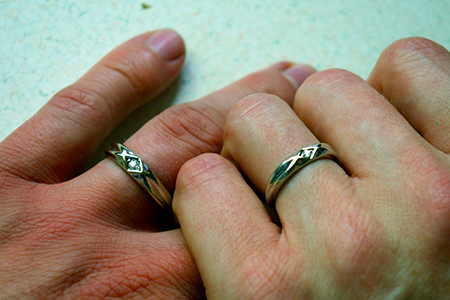New DU Study Highlights Risks of Living Together Before Engagement

More than half of Americans believe that moving in with a significant other before tying the knot is a good idea—that cohabitation before marriage or even engagement can increase their changes of a happy and successful marriage.
But a new national survey from the University of Denver, published by the Institute for Family Studies, says otherwise.
Psychologists and DU psychology professors Galena Rhoades and Scott Stanley say their findings indicate that living together before being engaged can actually decrease a couple’s odds of a successful marriage.
Rhoades and Stanley used a representative sample of approximately 1,600 Americans who were married for the first time between 2010 and 2019. The study found that 34% of marriages ended among those who lived together before being engaged, while just 23% of marriages ended among couples who waited until after engagement or marriage to move in together.
A pattern of results
The study’s results are in line with similar research Rhoades and Stanley have conducted over the years. One might assume that as societal norms around living together before marriage or engagement have shifted, the statistics on related divorce rates may have also changed. But, Stanley says, that’s simply not the case.
When people started studying this phenomenon back in the ‘70s and ‘80s, it was unusual for couples to live together before marriage, Stanley says. Now that it’s more common—with 70% of married couples having lived together first—some sociologists expected that the risk to diminish.
But Stanley and Rhoades did not. What they had found in previous studies is that the point at which a couple clarifies their intentions to marry makes a difference.
“That nuance is what's missed, oftentimes,” Rhoades says. “The risk is really in living together before the two of you have made a clear and mutual decision—and an announcement, even—to get married.”
Sliding versus deciding
In the current study, Rhoades and Stanley asked survey respondents who cohabited prior to marriage to one of the following descriptions as to why they started living together.
“We didn’t think about it or plan it. We slid into it.”
“We talked about it, but then it just sort of happened.”
“We talked about it, planned it, and then made a decision together to do it.”
Most people chose option one or two, which Rhoades and Stanley coded as having “slid” into living together, while they coded option three as “deciding” to live
together.
They found that those who slid into living together were 13 percentage points more likely to divorce, compared to those who had talked about it and decided beforehand. However, as Rhoades and Stanley note, this difference was cut in half after controlling for other characteristics of the survey participants, suggesting that some of the risk of sliding is due to factors like background characteristics, age at marriage or prior relationship history.
This finding, Stanley says, is less robust.
“Getting the sequence right about the timing of moving in together seems to matter more," he says.
“Based on this and other research, we do believe that sliding adds to risk and deciding is protective, and that partners should talk openly and clearly about living together—and what it means—beforehand,” Rhoades says. “But instead of talking merely about the nuts and bolts of moving in together, many couples need to talk about each partners’ expectations and intentions regarding marriage. Where is this relationship heading?”
Reasons for living together
Also important are the reasons people cite for moving in together.
Rhoades and Stanley asked respondents to choose one of the four following options as their top reason:
“Made sense financially.”
“Test the relationship.”
“Spend more time with partner.”
“Inconvenient to live apart.”
The most frequently reported top reason for moving in together was to spend more time with a partner. Rhoades and Stanley found that those who listed “made sense financially” and “test the relationship” as their top reasons were more likely to get divorced than those who reported moving in to spend more time together.
“Identifying the reason why you want to move in together is just as important as identifying the reason why you want to get married,” Rhoades says.
Asking tough questions about why you want to move in together is the best course of action, Stanley says—even if the answers are painful.
“It’s obviously not real wise to avoid asking yourself or your partner tough questions from time to time in a relationship,” he says. “I mean, one person could be totally sure they want to marry the other, but are they sure that their partner isn't kind of going along for the ride because, ‘We're already living together’?”
More cohabiting partners = higher risk of divorce
Another interesting finding from the study is that having a higher number of previous cohabitating partners (i.e., having lived with more romantic partners) is also associated with a higher risk of divorce.
Risks associated with having a higher number of cohabitating partners include having a more difficult romantic or family life, more strained economic circumstances, and higher odds of having children with different partners—all of which can increase your odds of divorce.
“More cohabitation experience will often also mean more experience with relationships ending, which can lower barriers to divorce,” the study says. “Although no one wants to see a marriage that is dangerous or damaging continue, many couples in marriage struggle at some point, and having a sense that one can easily move on can also mean moving toward the door too quickly in a marriage that might have succeeded with more effort.”
How to mitigate these risks
Despite these risks and concerns, Rhoades and Stanley say it’s not all doom and gloom. Even couples whose relationships include the aforementioned risk factors can work toward strengthening their relationships and lowering their odds of divorce.
“An earlier study of ours shows that people who lived together without being engaged can lower their risks after they are married,” Stanley says.
“We know from other research we've done that working on your relationship together or taking a relationship education class ameliorates the risk associated with having lived together before engagement,” Rhoades says. “Other studies we’ve conducted show that people who live together before they got engaged have more conflict and poor communication. Those are skills that people can learn, right? So, if you're married and you lived together before you got engaged, we might suggest that you take a look at your relationship and think about if there are some ways that you could work together to strengthen it.”
And that’s part of the work that Rhoades and Stanley do. They don’t just study relationships; they use the findings of their research to design programs that can help couples form healthier, stronger relationships.
“One of the reasons this is important, and why we want to study this, is that it's actionable research,” Rhoades adds. “This is something that people can make decisions about for themselves, which may impact their futures in really important ways. And I think I can speak for both of us in saying we like doing research that has an impact in that way, and that makes some meaningful contribution to how people live their lives.”






